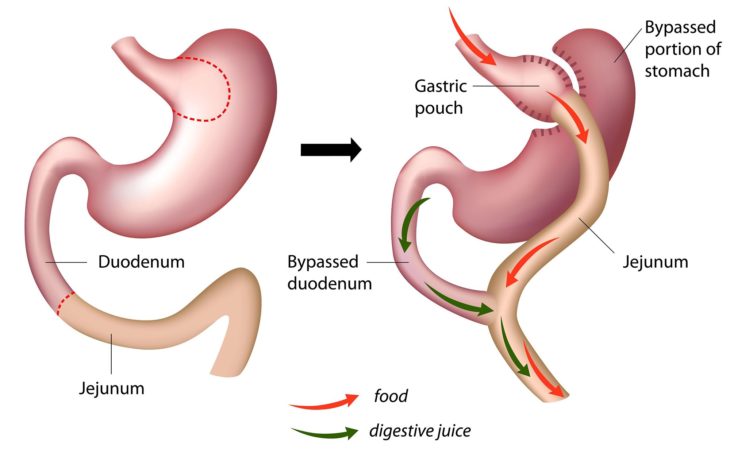Gastric bypass is a surgical procedure that helps you lose weight changing how your stomach and small intestine absorb the food you eat. After surgery, you feel full with less food.
Gastric bypass surgery is the most effective weight loss surgery. If you face health problems due to obesity and have tried to lose weight by dieting or doing exercise, this may be the best option for you. In this surgery, the surgeon staples a large section of the stomach, creating a tiny pouch and then connects the small intestine to the pouch. This small pouch can only stock a few ounces of food at a time after surgery. This connection causes the food to bypass part of the intestine so that some of the calories and nutrients in the food will not be absorbed. This results in weight loss.
Dr Peter Hamer performs both open and laparoscopic surgery. Laparoscopic surgery has several advantages over open surgery. In minimally invasive laparoscopic surgery, surgical instruments are inserted through small incisions instead of one large incision.

Source: University of Missouri Health Care
The benefits are:
● Faster recovery time
● Smaller wound
● Lower risk of infection
● No scarring
In general, gastric bypass patients may lose around 70 percent of their excess weight. However, it depends on individual circumstances. Let us know some more benefits of gastric bypass surgery.
Benefits of gastric bypass surgery
According to pristyncare.com weight loss is not the only benefit of gastric bypass surgery. You get free from a lot of other health problems and witness some amazing lifestyle changes. Let us go through the advantages of gastric bypass surgery.
● Long-term remission of diabetes of type 2 diabetes.
Studies have shown that the surgery is highly effective for obese patients and it helps control type 2 diabetes. It allows patients to remain insulin-free and adjunct medication for years after surgery.
● Improved cardiovascular health
The risk of coronary heart disease and stroke is decreased post gastric bypass surgery. The cholesterol level can return to normal and improves the overall health of the patient.
● Improvement of coexisting diseases
There is a high reduction in mortality rates due to significant improvement in the diseases that exist due to obesity. Bariatric surgery is all about massive weight loss that resolves obesity related co-morbidities such as high blood pressure, asthma, and other obesity-related breathing disorders, gastroesophageal reflux disease, cholesterol abnormalities, urinary incontinence, and more.
● Joint pain relief
Being obese puts a lot of stress on your weight-bearing joints which causes chronic pain and joint damage. The sustained weight loss after gastric bypass surgery relieves the stress on joints. It puts a stop on pain killers and people can enjoy much more mobility.
● Improved fertility
It may improve fertility in obese women during childbearing years. Pregnancy after gastric bypass surgery can be safe for both baby and mother than pregnancy complicated by obesity.
● No more depression
A lot of people feel depressed because of the obese looks and social stigma. Even today’s youth who carry significant weight find it difficult to participate in activities leading to isolation and depression. Losing extra weight can improve their physical, emotional and social health.
● Leads to a quality life
Surgical weight loss improves the overall quality of life in addition to improved health. The measures that are positively affected include reduced anxiety and depression, self-esteem, social interactions and sexual functions.
Gastric bypass surgery helps you break the vicious cycle of weight gain and help you achieve long term weight loss and improved healthy life. Let us look at the difference in hormonal changes between dietary weight loss and weight loss surgery.
● Dieting and after effects
The effects of dieting and exercise vary from person to person. Regular exercise alone may not give substantial weight loss or may take longer unless it is paired with a healthy diet. Sometimes you may feel that it is ok to intake extra calories since you burn some through work out. It may result in weight gain. It is important to have that will power to control calories intake.
● Bariatric surgery and after effects
The purpose of weight loss surgery is to reduce hunger and the amount of food stomach can comfortably hold. After the gastric sleeve surgery recovery period, the patient automatically eats less and lose weight. Therefore, naturally, you are inclined to overeat. A person builds positive changes to the nutrition habits to sustain long-term weight loss results.

Source: Medibulletin
How do you prepare yourself for gastric bypass surgery?
● Quit smoking.You must stop smoking weeks before you opt for the surgery. Smoking must be avoided even after surgery as it slows down the recovery process and increases the risk of other problems.
● Stop taking drugs such as aspirin, vitamin E, warfarin, or any other drug that forms blood clots. Consult the doctor about the drugs that can be taken.
Gastric bypass surgery needs commitment. To lose weight and avoid complications after the surgery, it is important to follow exercise and diet instructions given by the surgeon. It includes taking small meals, how to prevent nutritional deficiencies, which should be avoided and more. The most difficult part of the recovery process is lifestyle changes.
Conclusion
Some people find they have low blood sugar after surgery, some may feel weak, and a few don’t absorb all nutrients that the body needs. Visit a specialist to learn more about types of bariatric procedure and ask them about gastric bypass surgery, for more details, its effects, more about the diet and lifestyle changes.
